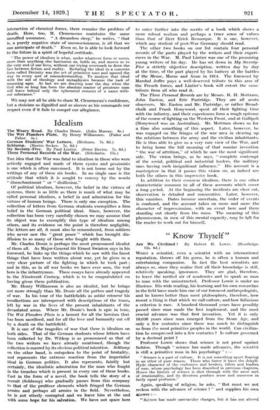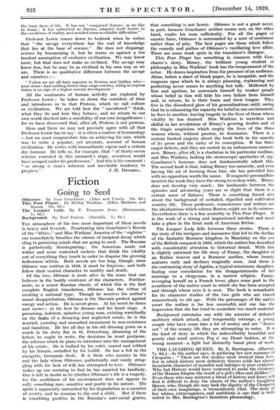" Know Thyself "
WHEN a scientist, even a scientist with an international reputation, throws off his gown, he is often a human and entertaining companion. In fact the best scientists are
always so, since they realise that all their knowledge is still, relatively speaking, ignorance. They are glad, therefore, to leave the rarified air of academies and to speak as man to man with the uninstructed. Professor Lowie is under no illusions. His wide reading, his learning and his own researches in the field have made him one of our foremost anthropologists, and he knows better than most philosophers, therefore, how recent a thing is that which we call culture, and how fallacious a criterion is race. A hundred thousand years have possibly passed since man made the first implement, and the most crucial advance was that first invention. Yet it is only 10,090 years since man emerged from the Stone Age, and only a few centuries since there was much to distinguish us from the most primitive peoples in the world. Can civiliza- tion be compressed into a few centuries ? Is culture governed
by a decimal point 2
Professor Lowie shows that science is not proof against fashion. Though " science has made advances, the scientist is still a primitive man in his psychology " ;—
" Science is a part of culture. It is not something apart floating in an ether of pure reason. Those who foster it have the Jekyll. Hyde character of the craftsmen and herders, tillers and leaders of men, whose psychology has been described in previous chapters. Hence tho history of science is shot through with the same sort of irrationality, and its devotees produce sense and nonsense in fairly equal profusion."
Again, speaking of religion, he asks, " But must we not reckon with the advance of science ? " and supplies his own ar4swer "8cianee has made speetaciilar changes, hilt it li;is not altered
the basic facts of life. It has not conquered Nature,' as we like to boast ; it has submitted to Nature, adapted itself better to the conditions of reality, and avoided some avoidable difficulties."
Professor Lowie comes down to bedrock when he writes that " the savage everywhere has the sort of knowledge that lies at the base of science." He does not disparage science by humanizing it, but he warns us against a too insolent assumption of exclusive civilization. We may know more, but that does not make us civilized. The savage may know less, but he may be as civilized in his own way as we are. There is no qualitative difference between the savage and ourselves :-
"Unless we are all born superior to Newton and Galileo, who— poor dears—had nothing better than stage-coaches, riding in express trains is no sign of a higher mental development."
All the continents of human activity are explored by Professor Lowie : he takes us down the corridors of time and introduces us to that Proteus, which we call culture or civilization. We are told how the " uncultured " think, what they do and how they behave, and we return to our own world shocked into a sensibility of our own insignificance : for we have discovered that, after all, Proteus is not protean.
Here and there we may not precisely agree with all that Professor Lowie has to say—it is often a matter of terminology —but we must congratulate him on achieving his aim, which was to write a popular, yet accurate, account of human civilization. He writes with transatlantic vigour and a certain dry humour. He tells us, for example, that " of thirty-seven witches executed in this monarch's reign, seventeen would have escaped under his predecessor." And this is his comment : " so strong is man's inherent and inevitable tendency to













































 Previous page
Previous page